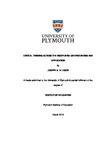Critical thinking across the disciplines: understanding and application
| dc.contributor.supervisor | Quinn, Jocey | |
| dc.contributor.author | Allison, Joseph | |
| dc.contributor.other | Plymouth Institute of Education | en_US |
| dc.date.accessioned | 2019-03-29T15:47:35Z | |
| dc.date.available | 2019-03-29T15:47:35Z | |
| dc.date.issued | 2019 | |
| dc.identifier | 783301 | en_US |
| dc.identifier.uri | http://hdl.handle.net/10026.1/13587 | |
| dc.description.abstract |
This thesis explores the concept of critical thinking from the perspective of academic staff based in four different University discipline areas. Looking specifically at the relationship between their personal understanding of this concept, and how they then try and convey it to their students. The empirical data informing this study is drawn from interviews with the academic staff, as well as observations of their teaching practice. Underpinned by a critical realist perspective, the study focused upon on the structures of higher education that influence this relationship, between understanding and facilitation, as well as the agency experienced by both the staff and students. Critical thinking is a concept that is steeped in the traditional liberal values of higher education, which informs how many academic staff have come to understand it. However, increasing pressures placed upon higher education curricula and practices, many of which stem from neoliberal priorities, such as market principles, and the commercialisation and commodification of degrees, impact on how critical thinking is, or can be, addressed. A combined theoretical framework, consisting of Bernstein’s pedagogic device theory, to trace the macro and micro influences on university structures and teaching-learning interactions, as well as Bourdieu’s theories of field, habitus and capital, to inform issues of agency in these areas, has been utilised. Providing a unique lens through which to consider the disciplinary knowledge practices of each discipline area, and how these impact on the development of critical thinking. Whilst a number of studies have explored disciplinary understandings of critical thinking, none of them as yet have considered this insight alongside observations of practice. Whilst the findings from this study highlight a number points, there are a couple that will be particularly useful more widely in the organising and structuring of curricula. Predominantly, that there is disconnect between the understanding academic staff have of critical thinking and how they find themselves having to teach it, sometimes to their great frustration. Furthermore, that valuable insight can be achieved through the consideration of disciplinary knowledge practices and teaching-learning interactions in relation to control and agency, which appear to have quite a considerable impact on student engagement. Greater understanding and interesting glimpses of possible areas of future study have been revealed through this approach into what is a widely, highly valued but hard to define subject, one that is pertinent to so much of higher education. | en_US |
| dc.language.iso | en | |
| dc.publisher | University of Plymouth | |
| dc.subject | Critical thinking | en_US |
| dc.subject | Higher Education | |
| dc.subject | Bernstein | |
| dc.subject | Bourdieu | |
| dc.subject | Classification and framing | |
| dc.subject | Habitus | |
| dc.subject | Capital | |
| dc.subject | Critical Realism | |
| dc.subject.classification | Other (e.g., MD, EdD, DBA, DClinPsy) | en_US |
| dc.title | Critical thinking across the disciplines: understanding and application | en_US |
| dc.type | Thesis | |
| plymouth.version | publishable | en_US |
| dc.identifier.doi | http://dx.doi.org/10.24382/495 | |
| dc.identifier.doi | http://dx.doi.org/10.24382/495 | |
| dc.rights.embargoperiod | No embargo | en_US |
| dc.type.qualification | Doctorate | en_US |
| rioxxterms.version | NA |
Files in this item
This item appears in the following Collection(s)
-
01 Research Theses Main Collection
Research Theses Main


